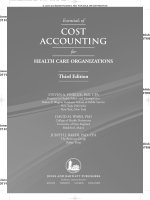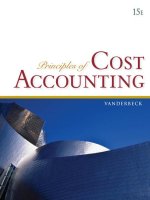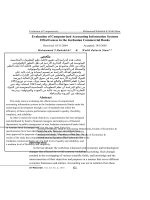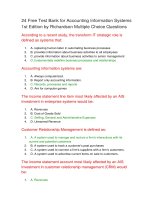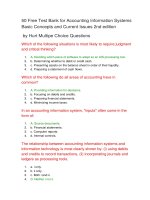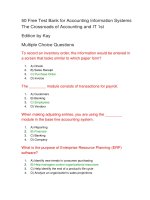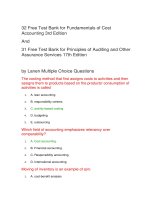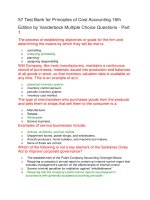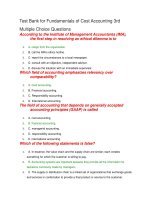57 test bank for principles of cost accounting 16t1
Bạn đang xem bản rút gọn của tài liệu. Xem và tải ngay bản đầy đủ của tài liệu tại đây (38.87 KB, 11 trang )
57 Test Bank for Principles of Cost Accounting 16th
Edition by Vanderbeck Multiple Choice Questions - Part
1
The process of establishing objectives or goals for the firm and
determining the means by which they will be met is:
1.
2.
3.
4.
controlling.
analyzing profitability.
planning.
assigning responsibility.
Witt Company, like most manufacturers, maintains a continuous
record of purchases, materials issued into production and balances
of all goods in stock, so that inventory valuation data is available at
any time. This is an example of a(n)
1.
2.
3.
4.
perpetual inventory system.
inventory control account.
periodic inventory system.
inventory cost method.
The type of merchandiser who purchases goods from the producer
and sells them to shops that sell them to the consumer is a:
1.
2.
3.
4.
Manufacturer.
Retailer.
Wholesaler.
Service business.
Examples of service businesses include:
1.
2.
3.
4.
Airlines, architects, and hair stylists.
Department stores, poster shops, and wholesalers.
Aircraft producers, home builders, and machine tool makers.
None of these are correct.
Which of the following is not a key element of the Sarbanes Oxley
Act to improve corporate governance?
1.
2.
The establishment of the Public Company Accounting Oversight Board
Requiring a company’s annual report to contain an internal control report that
includes management’s opinion on the effectiveness of internal control
3. Severe criminal penalties for retaliation against “whistleblowers”
4. Requiring that the company’s performance reports are prepared in
accordance with generally accepted accounting principles
A(n) __________ requires estimating inventory balances during the
year for interim financial statements and shutting down operations
to count all inventory items at the end of the year.
1.
2.
3.
4.
periodic inventory system
inventory control account
perpetual inventory system
inventory cost method
Unit cost information is important for making all of the following
marketing decisions except:
1.
2.
3.
4.
Determining the selling price of a product.
Bidding on contracts.
Determining the amount of advertising needed to promote the product.
Determining the amount of profit that each product earns.
A budget:
1.
2.
3.
4.
is a monthly financial statement issued to a company’s lenders.
is management’s operating plan expressed in units and dollars.
documents the production department’s schedule.
is the basis for the annual sales forecast.
ISO 9000 is a set of international standards for:
1.
2.
3.
4.
determining the selling price of a product.
cost control.
quality management.
planning.
Ashley Corp. had finished goods inventory of $50,000 and $60,000
at April 1 and April 30, respectively, and cost of goods manufactured
of $175,000 in April. Cost of goods sold in April was:
1.
2.
3.
4.
$165,000
$175,000
$185,000
$225,000
Taylor Logan is an accountant with the Tanner Corporation. Taylor’s
duties include preparing reports that focus on both historical and
estimated data needed to conduct ongoing operations and do longrange planning. Taylor is a(n)
1.
2.
3.
4.
certified financial planner.
management accountant.
financial accountant.
auditor.
Cost accounting differs from financial accounting in that financial
accounting:
1.
2.
3.
Is mostly concerned with external financial reporting.
Is mostly concerned with individual departments of the company.
Provides the additional information required for special reports to
management.
4. Puts more emphasis on future operations.
For a manufacturer, manufacturing costs incurred to date for goods
in various stages of production, but not yet completed is:
1.
2.
3.
4.
Merchandise Inventory.
Finished Goods.
Work in Process.
Materials.
The business entity that purchases finished goods for resale is a:
1.
2.
3.
4.
Manufacturer.
Merchandiser.
Service business.
For-profit service business.
Which of the following items of cost would be least likely to appear
on a performance report based on responsibility accounting for the
supervisor of an assembly line in a large manufacturing situation?
1.
2.
3.
4.
Direct labor
Indirect materials
Selling expenses
Repairs and maintenance
Control is the process of monitoring the company’s operations to
determine whether the company’s objectives are being achieved.
Effective control is achieved through all of the following except:
1.
2.
3.
4.
periodically measuring and comparing company results.
assigning responsibility for costs to employees responsible for those costs.
constantly monitoring employees to ensure they do exactly as they are told.
taking necessary corrective action when variances warrant doing so.
For a manufacturer, the cost of all materials purchases and on hand
to be used in the manufacturing process is:
1.
2.
3.
4.
Merchandise Inventory.
Finished Goods.
Work in Process.
Materials.
In the financial statements, Materials should be categorized as:
1.
2.
3.
4.
Revenue.
Expenses.
Assets.
Liabilities.
The balance in Post Industries’ Finished Goods account at
December 30 was $425,000. Its December cost of goods
manufactured was $1,350,000, its total manufacturing costs were
$1,500,000 and its cost of goods sold in December was
$1,455,000. What was the balance in Post’s Finished Goods at
December 1?
1.
2.
3.
4.
$380,000
$320,000
$470,000
$530,000
Dan Louis is the supervisor of the Assembly Department of
Wiggerman Corporation. He has control over and is responsible for
manufacturing costs traced to the department. The Assembly
Department is an example of a(n):
1.
2.
3.
4.
cost center.
inventory center.
supervised work center.
worker’s center.
Umberg Merchandise Company’s cost of goods sold last month
was $1,350,000. the Merchandise Inventory at the beginning of the
month was $250,000 and there was $325,000 of Merchandise
Inventory at the end of the month. Umberg’s merchandise
purchases were:
1.
2.
3.
4.
$1,350,000
$1,275,000
$1,425,000
$1,675,000
Which of the following items of cost would be least likely to appear
on a performance report based on responsibility accounting for the
supervisor of an assembly line in a large manufacturing situation?
1.
2.
3.
Direct labor
Supervisor's salary
Materials
4.
Repairs and maintenance
The business entity that converts purchased raw materials into
finished goods by using labor, technology, and facilities is a:
1.
2.
3.
4.
Manufacturer.
Merchandiser.
Service business.
Not-for-profit service agency.
Joshua Company prepares monthly performance reports for each
department. The budgeted amounts of wages for the Finishing
Department for the month of August and for the eight-month period
ended August 31 were $12,000 and $100,000, respectively. Actual
wages paid through July were $91,500, and wages for the month of
August were $11,800. The month and year-to-date variances,
respectively, for wages on the August performance report would
be:
1.
2.
3.
4.
$200 F; $8,500 F
$200 F; $3,300 U
$200 U; $3,300 U
$200 U; $8,500 F
For a manufacturer, the total cost of manufactured goods completed
but still on hand is:
1.
2.
3.
4.
Merchandise Inventory.
Finished Goods.
Work in Process.
Materials.
Which of the following statements best describes a characteristic of
a performance report prepared for use by a production line
department head?
1.
The costs in the report should include only those controllable by the
department head.
2. The report should be stated in dollars rather than in physical units so the
department head knows the financial magnitude of any variances.
3. The report should include information on all costs chargeable to the
department, regardless of their origin or control.
4. It is more important that the report be precise than timely.
Inventory accounts for a manufacturer include all of the following
except:
1.
2.
Merchandise Inventory.
Finished Goods.
3.
4.
Work in Process.
Materials.
Responsibility accounting would most likely hold a manager of a
manufacturing unit responsible for:
1.
2.
3.
4.
cost of raw materials.
quantity of raw materials used.
the number of units ordered.
amount of taxes incurred.
57 Free Test Bank for Principles of Cost Accounting 16th
Edition by Vanderbeck Multiple Choice Questions - Part
2
Under a job order cost system of accounting, the entry to distribute
payroll to the appropriate accounts would be:
1.
2.
Debit-Payroll Credit-Wages Payable
Debit-Work in Process Debit-Factory Overhead Debit-Selling and
Administrative Expense Credit-Payroll
3. Debit-Work in Process Debit-Finished Goods Debit-Cost of Goods Sold
Credit-Payroll
4. Debit-Work in Process Debit-Factory Overhead Debit-Selling and
Administrative Expense Credit-Wages Payable
When should process costing techniques be used in assigning
costs to products?
1.
2.
3.
4.
In situations where standard costing techniques should not be used
If products manufactured are substantially identical
When production is only partially completed during the accounting period
If products are manufactured on the basis of each order received
A typical factory overhead cost is:
1.
2.
3.
4.
Freight out.
Stationery and printing.
Depreciation on machinery and equipment.
Postage.
Arnold Furniture Company produced 4,000 chairs in July. The
manufacturing costs were: Direct materials $25,000; Direct labor
11,000; Factory overhead 12,000; Selling expense 5,000;
Administrative expense 6,000. The cost per tent is:
1.
2.
3.
$14.75.
$12.00.
$9.00.
4.
$6.25.
The entry to record depreciation of the production equipment would
be:
1.
Debit - Depreciation Expense - Equipment Credit - Accumulated Depreciation
- Equipment
2. Debit - Depreciation Expense - Equipment Credit - Factory Overhead
3. Debit - Factory Overhead Credit - Accumulated Depreciation - Equipment
4. Debit - Work-in-Process Credit - Accumulated Depreciation - Equipment
The following data are from Baker Company, a manufacturer, for
the month of October: Machine operators’ wages $100,000;
Supervisors’ salaries 3,000; Factory insurance 7,500; Secretary to
the Chief Executive Officer salary 1,500; Machine depreciation
17,500; Sales office rent and utilities 11,000; Direct materials used
67,500. Compute the conversion costs.
1.
2.
3.
4.
$167,500
$104,500
$140,500
$128,000
Factory overhead includes:
1.
2.
3.
4.
Indirect labor but not indirect materials.
Indirect materials but not indirect labor.
All manufacturing costs, except indirect materials and indirect labor.
All manufacturing costs, except direct materials and direct labor.
Payroll is debited and Wages Payable is credited to:
1.
2.
3.
4.
Pay the payroll taxes.
Record the payroll.
Pay the payroll.
Distribute the payroll.
At a certain level of operations, per unit costs and selling price are
as follows: manufacturing costs, $50; selling and administrative
expenses, $10; selling price, $80. Given this information, the markon percentage to manufacturing cost used to determine selling price
must have been:
1.
2.
3.
4.
40 percent.
60 percent.
33 percent.
25 percent.
A standard cost system is one:
1.
2.
that provides a separate record of cost for each special-order product.
that uses predetermined costs to furnish a measurement that helps
management make decisions regarding the efficiency of operations.
3. that accumulates costs for each department or process in the factory.
4. where costs are accumulated on a job cost sheet.
The term "prime cost" refers to:
1.
2.
3.
The sum of direct labor costs and all factory overhead costs.
The sum of direct material costs and direct labor costs.
All costs associated with manufacturing other than direct labor costs and
direct material costs.
4. Manufacturing costs incurred to produce units of output.
In job order costing, the basic document for accumulating the cost
of each job is the:
1.
2.
3.
4.
Job cost sheet.
Requisition sheet.
Purchase order.
Invoice.
The statement of costs of goods manufactured shows:
1.
2.
3.
4.
Office supplies used in accounting office.
Deprecation of factory building.
Salary of sales manager.
Rent paid on finished goods warehouse.
Which of the following production operations would be most likely to
employ a job order system of cost accounting?
1.
2.
3.
4.
Candy manufacturing
Crude oil refining
Printing business cards
Flour milling
According to the Institute of Management Accountants (IMA)
Statement of Ethical Professional Practice, under the Integrity
Standard, each member has the responsibility to:
1.
2.
3.
4.
Communicate information fairly and objectively.
Keep information confidential.
Mitigate actual conflicts of interest.
Maintain an appropriate level of professional competence.
Under a job order system of cost accounting, Cost of Goods Sold is
debited and Finished Goods is credited for a:
1.
2.
Transfer of materials to the factory.
Shipment of completed goods to the customer.
3.
4.
Transfer of completed production to the finished goods storeroom.
Purchase of goods on account.
The Institute of Management Accountants (IMA) Statement of
Professional Practice includes all of the following standards except:
1.
2.
3.
4.
Confidentiality.
Commitment.
Integrity.
Competence.
Joey Bruce is a cost accountant at ABC Industries. Joey told Tanner
Scott, his financial advisor, that he was working on a project to
determine the feasibility of a merger of ABC Industries with Left
Guard Company, a major competitor. Which of the Institute of
Management Accountant’s (IMA) ethical standards may have been
violated?
1.
2.
3.
4.
Competence
Confidentiality
Integrity
Credibility
Mountain Company produced 20,000 blankets in June to be sold
during the holiday season. The manufacturing costs were: Direct
materials $125,000; Direct labor 55,000; Factory overhead 60,000;
Management has decided that the mark-on percentage necessary
to cover the product’s share of selling and administrative expenses
and to earn a satisfactory profit is 30%. The selling price per blanket
should be:
1.
2.
3.
4.
$12.00.
$15.60.
$23.60.
$31.20.
Tom Jones, a management accountant, was faced with an ethical
conflict at the office. According to the Institute of Management
Accountants’ (IMA) Statement of Professional Practice, the first
action Tom should pursue is to:
1.
2.
3.
4.
follow his organization’s established policies on the resolution of such conflict.
contact the local newspaper.
contact the company’s audit committee.
consult an attorney.
An industry that would most likely use process costing procedures
is:
1.
2.
3.
4.
Beverage.
Home Construction.
Printing.
Shipbuilding.
Which of the following is not a cost that is accumulated in Work in
Process?
1.
2.
3.
4.
Direct materials
Administrative expense
Direct labor
Factory overhead
Which of the following is most likely to be considered an indirect
material in the manufacture of a sofa?
1.
2.
3.
4.
Lumber
Glue
Fabric
Foam rubber
The term "conversion costs" refers to:
1.
2.
3.
4.
The sum of direct labor costs and all factory overhead costs.
The sum of direct material costs and direct labor costs.
All costs associated with manufacturing other than direct labor costs.
Direct labor costs incurred to produce units of output.
A law firm wanting to track the costs of serving different clients may
use a:
1.
2.
3.
4.
process cost system.
job order cost system.
cost control system.
standard cost system.
Under a job order system of cost accounting, the dollar amount of
the entry to transfer inventory from Work in Process to Finished
Goods is the sum of the costs charged to all jobs:
1.
2.
3.
4.
In process during the period.
Completed and sold during the period.
Completed during the period.
Started in process during the period.
The wages of which of the following employees would not be
included in the product cost for a manufacturer of custom-built
home cooking appliances?
1.
shipping clerk
2.
3.
4.
appliance body welder
factory janitor
shop floor supervisor
Factory overhead would include:
1.
2.
3.
4.
Wages of office clerk.
Sales manager’s salary.
Supervisor’s salary.
Tax accountant’s salary.
Multiple Choice 0 points Modify Remove According to the Institute
of Management Accountants (IMA) Statement of Ethical
Professional Practice, performing professional duties in accordance
with relevant laws, regulations and technical standards is a
component of which standard?
1.
2.
3.
4.
Competence
Confidentiality
Integrity
Credibility
Total Points: 0 correct out of 57
